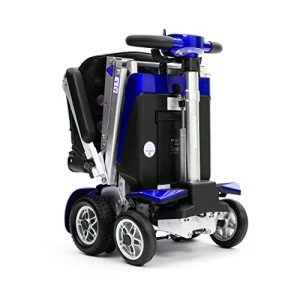The 10 Scariest Things About Mobility Scooter
A Comprehensive Guide to Buying a Mobility Scooter
Mobility scooters have ended up being an important tool for lots of individuals aiming to enhance their self-reliance and mobility. With a huge variety of designs and features readily available, choosing the right mobility scooter can be daunting. This short article offers a useful guide to help customers navigate their alternatives, examine their requirements, and make a notified purchase.
Comprehending Mobility Scooters
Mobility scooters are electric lorries designed for people who experience mobility difficulties. They are particularly helpful for senior citizens, those with specials needs, or people recovering from injuries. Mobility scooters can differ commonly in regards to style, functions, and rates.
Types of Mobility Scooters
Before embarking on a purchase, it's vital to understand the various types of mobility scooters offered:
Three-Wheel Scooters:
- Generally more maneuverable in tight spaces
- Lightweight and portable
- Perfect for indoor use
Four-Wheel Scooters:
- Offer higher stability and balance
- Suitable for outdoor use over numerous surfaces
- Generally have a longer battery life
Foldable/Portable Scooters:
- Designed to be quickly carried and kept
- Can typically fit in the trunk of an automobile
- Ideal for those who travel often
Durable Scooters:
- Built to accommodate larger individuals
- Typically come with more robust functions for outdoor use
- Generally equipped with bigger batteries for prolonged range
Aspects to Consider When Buying a Mobility Scooter
1. Weight Capacity
Pick a mobility scooter that can support the user's weight. The majority of scooters have a weight limit ranging from 250 to 500 pounds. It is important to ensure that the scooter can accommodate the user easily.
2. Variety and Battery Life
The variety is how far the mobility scooter can take a trip on a single charge. Normal ranges differ in between 10 to 30 miles. Consider the user's everyday activities and pick a scooter with an ideal range.
3. Scooter Dimensions
Think about the size of the scooter, including its weight and dimensions. A more compact scooter may be ideal for narrow corridors and tight areas, while larger models provide additional stability and comfort.
4. Surface Capability
Assess where the scooter will mostly be used. If the user prepares to take a trip mostly on pavement, a lightweight design might be adequate. Nevertheless, if the user needs to pass through gravel or irregular surface areas, consider a four-wheel scooter built for off-road usage.
Top Features to Look For
Convenience
- Adjustable Seats: Look for scooters with cushioned and height-adjustable seats to guarantee comfort throughout travel.
- Armrests: These enhance safety and support while browsing.
Security and Visibility
- Headlights and Taillights: Essential for nighttime use.
- Turn Signals and Reflectors: Improve exposure and safety while on the roadway.
User-Friendly Controls
- Joystick or Drive Controls: These ought to be intuitive and simple to manipulate.
- Easy-to-Read Displays: A control board that shows battery life, speed, and range can improve the user experience.
Extra Features
- Storage Compartments: These offer included benefit for carrying personal products while on the go.
- Weather Protection: Consider models with rain covers or windshields if used in variable weather conditions.
Expense Considerations
When budgeting for a mobility scooter, costs can vary anywhere from ₤ 500 to over ₤ 5,000 depending on the model, functions, and brand name. Extra costs might consist of:
- Extended Warranty: Protects versus flaws and can conserve cash in the long run.
- Accessories: Optional functions, such as upgraded seats, lights, or storage services.
Function
Expense Range
Basic Models
₤ 500 – ₤ 1,500
Mid-Range Models
₤ 1,500 – ₤ 3,000
High-End Models
₤ 3,000 – ₤ 5,000
Financing Options
Lots of sellers use funding strategies, and some city government initiatives may supply grants or assistance for those in requirement. Examine possible financial assistance with neighborhood resources or mobility service companies.
FAQs about Buying a Mobility Scooter
What is the difference in between a mobility scooter and a wheelchair?
Mobility scooters are motorized and allow users to browse individually, while wheelchairs might require physical support or manual operation.
How do I maintain a mobility scooter?
Regular upkeep involves checking battery life, cleaning the scooter, and inspecting tires and brakes. Always describe the user handbook for particular guidelines.
Can mobility scooters be used indoors?
Yes, numerous designs are developed for both indoor and outdoor usage. Nevertheless, three-wheel scooters tend to be better fit for indoor navigation due to their tighter turning radius.
Are mobility scooters covered by insurance?
Some insurance coverage plans cover a part of the costs for mobility scooters if they are deemed clinically required. Contact your supplier for particular information.
How quick can a mobility scooter go?
The majority of mobility scooters have an optimal speed ranging from 4 to 8 mph. Nevertheless, the proper pace may vary depending on local regulations.
Purchasing a mobility scooter can significantly boost one's self-reliance and lifestyle. By comprehending My Mobility Scooters , functions, and expenses associated with mobility scooters, potential purchasers can make educated choices that suit their needs and preferences. Customization and extensive research study are essential to guaranteeing complete satisfaction with this essential financial investment.
